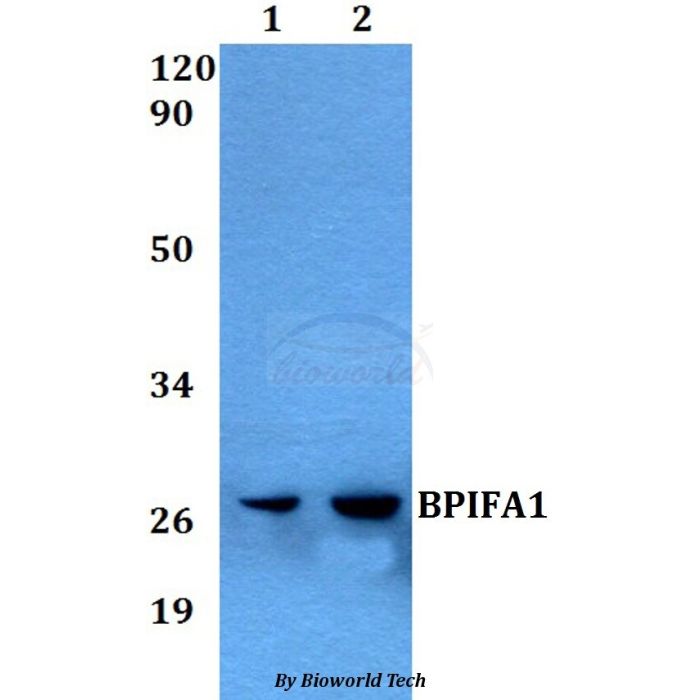BPIFA1 polyclonal, anti-human, rat
€305.00
In stock
SKU
BS60562
Background:
The upper respiratory tract is the main place of entry for pathogens to invade the body, and early recognition of bacterial products in this region is crucial for host defense. Palate lung nasal epithelial clone PLUNC (or LUNX) is an airway specific secretory protein that is expressed in epithelial tissues and submucosal glands of the oral cavity and upper respiratory tract of humans, mice, rats and cows. PLUNC binds to lipopolysaccharide (LPS) in nasal lavage fluid (NLF) which points to its role in the inflammatory response of the upper airways after exposure to irritants. Decreased levels of PLUNC occur in the NLF of smokers and people who have been exposed to reactive epoxy chemicals, indicating that long-term exposure to airway irritants impairs the production of PLUNC in the upper respiratory tract. Abnormal expression of PLUNC may influence susceptibility to nasopharyngeal carcinoma in the Chinese population.
Alternative Name:
BPI fold-containing family A member 1, Lung-specific protein X, Nasopharyngeal carcinoma-related protein, Palate lung and nasal epithelium clone protein, Secretory protein in upper respiratory tracts, Short PLUNC1, SPLUNC1, Tracheal epithelium-enriched protein, Von Ebner protein Hl, BPIFA1, LUNX, NASG, PLUNC, SPLUNC1, SPURT, UNQ787, PRO1606
Application Dilution: WB: 1:500~1:1000
Specificity: BPIFA1 polyclonal antibody detects endogenous levels of BPIFA1 protein.
Immunogen:
A synthetic peptide corresponding to residues in Human BPIFA1
MW: ~ 27 kDa
Swis Prot.: Q9NP55
Purification & Purity:
The antibody was affinity-purified from rabbit antiserum by affinity-chromatography using epitope-specific immunogen and the purity is > 95% (by SDS-PAGE).
Format:
1 mg/ml in Phosphate buffered saline (PBS) with 15 mM sodium azide, approx. pH 7.2.
Storage:
Store at 4°C short term. Aliquot and store at -20°C long term. Avoid freeze-thaw cycles.
For research use only, not for use in diagnostic procedure.
The upper respiratory tract is the main place of entry for pathogens to invade the body, and early recognition of bacterial products in this region is crucial for host defense. Palate lung nasal epithelial clone PLUNC (or LUNX) is an airway specific secretory protein that is expressed in epithelial tissues and submucosal glands of the oral cavity and upper respiratory tract of humans, mice, rats and cows. PLUNC binds to lipopolysaccharide (LPS) in nasal lavage fluid (NLF) which points to its role in the inflammatory response of the upper airways after exposure to irritants. Decreased levels of PLUNC occur in the NLF of smokers and people who have been exposed to reactive epoxy chemicals, indicating that long-term exposure to airway irritants impairs the production of PLUNC in the upper respiratory tract. Abnormal expression of PLUNC may influence susceptibility to nasopharyngeal carcinoma in the Chinese population.
Alternative Name:
BPI fold-containing family A member 1, Lung-specific protein X, Nasopharyngeal carcinoma-related protein, Palate lung and nasal epithelium clone protein, Secretory protein in upper respiratory tracts, Short PLUNC1, SPLUNC1, Tracheal epithelium-enriched protein, Von Ebner protein Hl, BPIFA1, LUNX, NASG, PLUNC, SPLUNC1, SPURT, UNQ787, PRO1606
Application Dilution: WB: 1:500~1:1000
Specificity: BPIFA1 polyclonal antibody detects endogenous levels of BPIFA1 protein.
Immunogen:
A synthetic peptide corresponding to residues in Human BPIFA1
MW: ~ 27 kDa
Swis Prot.: Q9NP55
Purification & Purity:
The antibody was affinity-purified from rabbit antiserum by affinity-chromatography using epitope-specific immunogen and the purity is > 95% (by SDS-PAGE).
Format:
1 mg/ml in Phosphate buffered saline (PBS) with 15 mM sodium azide, approx. pH 7.2.
Storage:
Store at 4°C short term. Aliquot and store at -20°C long term. Avoid freeze-thaw cycles.
For research use only, not for use in diagnostic procedure.
| Is Featured? | No |
|---|
Write Your Own Review

